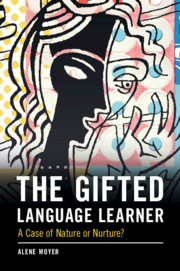
-
Select format
-
- Publisher:
- Cambridge University Press
- Publication date:
- 10 June 2021
- 24 June 2021
- ISBN:
- 9781108697408
- 9781108482691
- 9781108710862
- Dimensions:
- (228 x 152 mm)
- Weight & Pages:
- 0.5kg, 208 Pages
- Dimensions:
- (228 x 152 mm)
- Weight & Pages:
- 0.31kg, 208 Pages
You may already have access via personal or institutional login
Book description
Language learners beyond early childhood are scarcely expected to reach native-like abilities in their new language, yet some do. Are these individuals uniquely gifted? If so, are such gifts innate, or the result of intense drive, optimal experience, opportunity, or something else altogether? Bringing together theory and empirical work from across disciplines, this ground-breaking book aims to better understand the perennial mystery of giftedness in language learning (GLL). Incorporating quantitative, qualitative, and case study data, this analysis demonstrates the need to reach across cognitive, neural, emotional, psychological, and social lines to understand native-likeness in a second language. All such 'outliers' face limits, potentials, and choices. What they do in the face of these is key. With this complexity in mind, specific recommendations are provided to re-orient the research toward an appreciation of the individual's role, and a clearer understanding of the inherent balance of nature and nurture in GLL.
Contents
Metrics
Altmetric attention score
Full text views
Full text views help Loading metrics...
Loading metrics...
* Views captured on Cambridge Core between #date#. This data will be updated every 24 hours.
Usage data cannot currently be displayed.
Accessibility standard: Unknown
Why this information is here
This section outlines the accessibility features of this content - including support for screen readers, full keyboard navigation and high-contrast display options. This may not be relevant for you.
Accessibility Information
Accessibility compliance for the HTML of this book is currently unknown and may be updated in the future.


